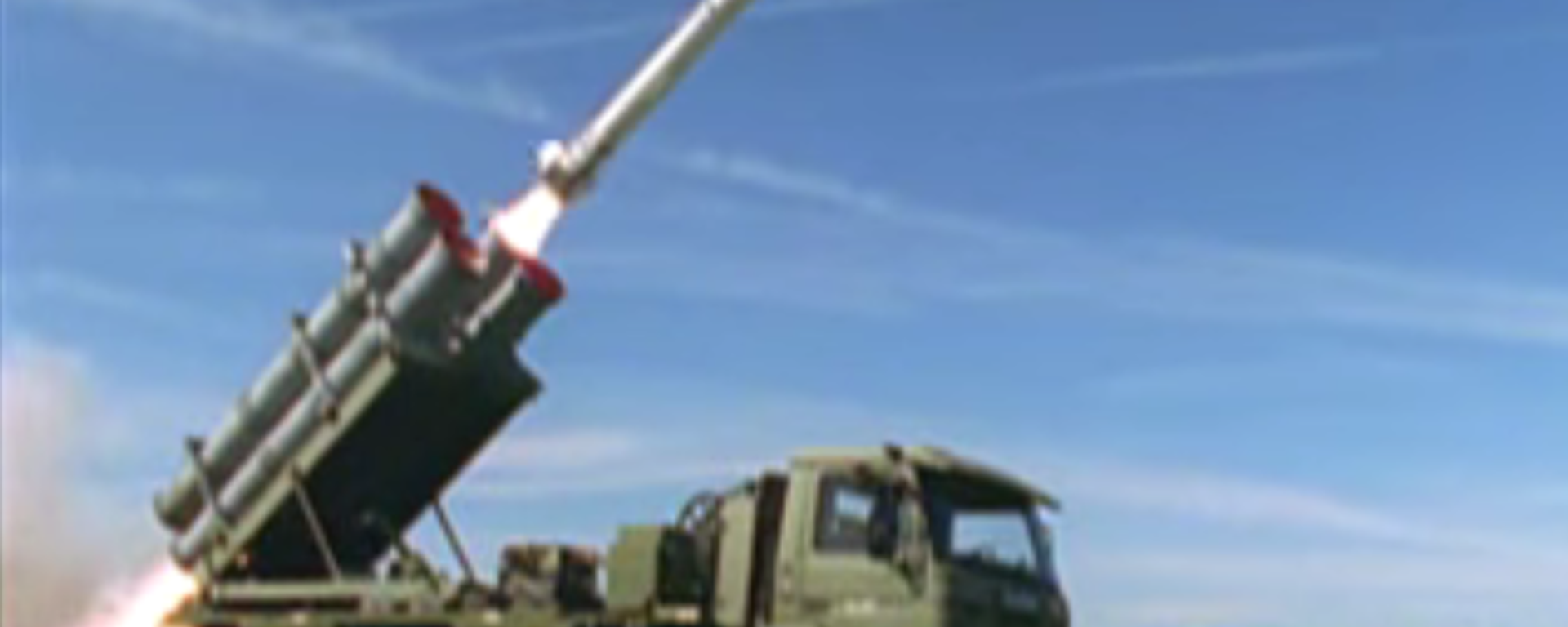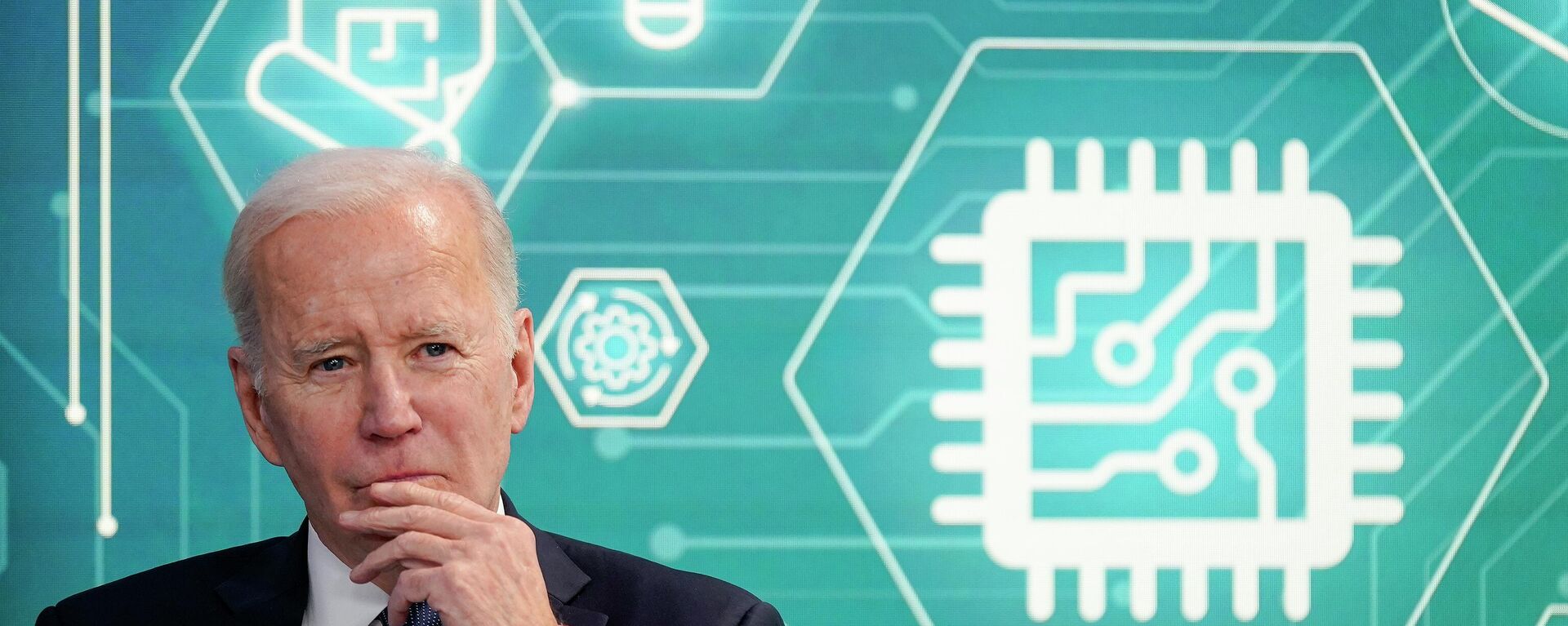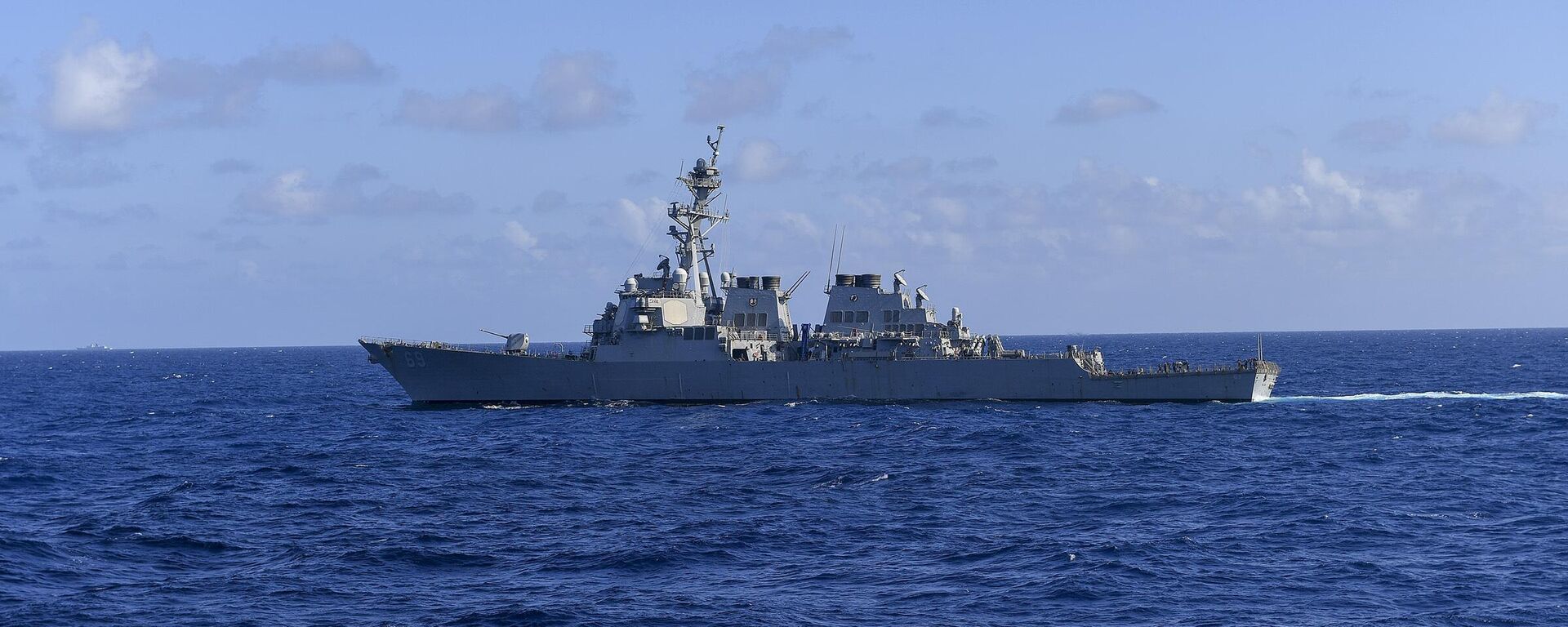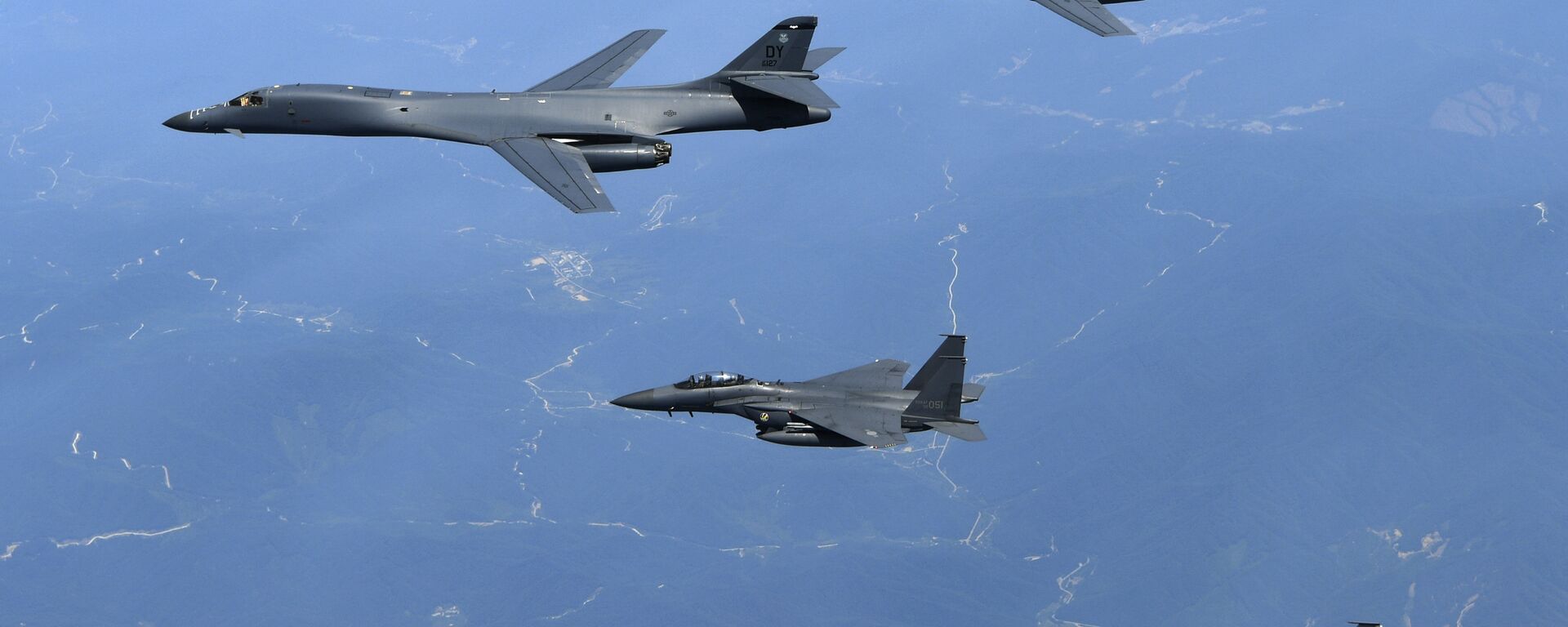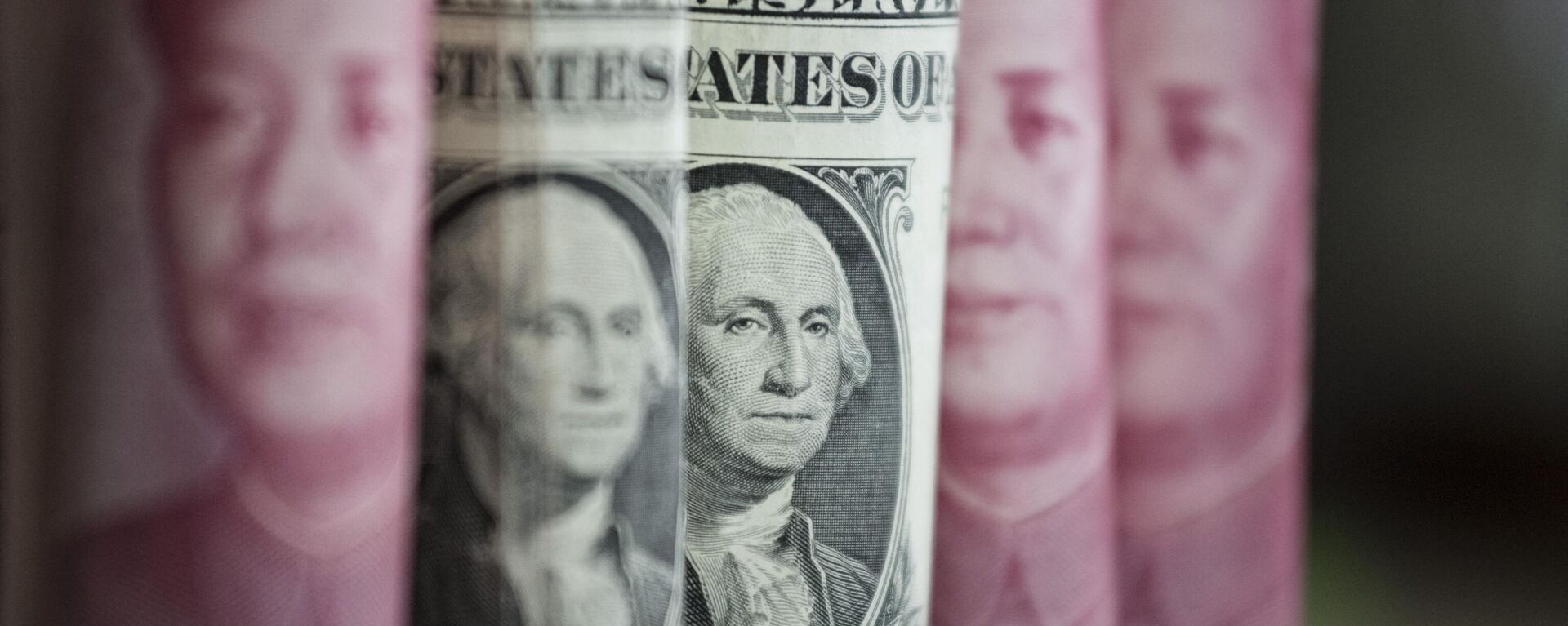https://sputnikglobe.com/20230419/us-missile-sales-advisors-on-taiwan-signal-death-throes-of-empire-1109664848.html
US Missile Sales and Advisors in Taiwan Signal Death Throes of Empire
US Missile Sales and Advisors in Taiwan Signal Death Throes of Empire
Sputnik International
China-US tensions over Taiwan are centered around Beijing’s concerns that Washington may try to nudge the island into a unilateral declaration of ‘independence’ instead of gradual reunification with the mainland. US leaders have not done much to alleviate these anxieties, ramping up arms sales and enhancing ‘informal’ diplomatic ties with Taipei.
2023-04-19T16:33+0000
2023-04-19T16:33+0000
2023-06-19T12:46+0000
analysis
harpoon missile
military advisors
analysis
observers
karen kwiatkowski
scott bennett
taiwan
https://cdn1.img.sputnikglobe.com/img/07e7/04/13/1109666320_0:160:3072:1888_1920x0_80_0_0_673992f6831e624021c682dc6a79d284.jpg
Sino-US tensions received another major boost this week amid media reports that Washington plans to sell over $1.1 billion-worth of Harpoon anti-ship missiles to Taiwan and revelations that the US military has dispatched some 200 advisors to bases across the island to support the training of Taiwanese troops and reserve forces.Both actions are illegal under treaties which underpin Sino-US relations. In 1982, the two countries signed a communique which requires Washington to gradually whittle its arms sales to Taiwan down to zero. Forty years later, the US has failed to live up to its commitments. More significantly, under the 1979 Shanghai Communique on the establishment of diplomatic relations, the US acknowledged “that there is but one China” and that “Taiwan is part of China.” That makes the deployment of any US troops on the island illegal – basically the equivalent of the People’s Republic deploying its military on US territory without Washington’s authorization.“Clearly, the US military investment is growing – and it may be shifting to a ‘dug in’ scenario,” says Karen Kwiatkowski, a former US Department of Defense (DoD) analyst and retired Air Force lieutenant colonel.Characterizing US policy toward Taiwan as seemingly aimed at provoking Beijing into an open conflict, the former Pentagon analyst expressed hope that China’s leaders will not fall into Washington’s trap.The observer expects any military show of force to be complemented with political measures – such as exposing the corruption of the Biden family ahead of the 2024 election, or introducing restrictions on sensitive industrial or technology exports. A direct military response would be a measure of last resort for Beijing, Kwiatkowski emphasized.“For China and for nearly half of the Taiwanese, they are one culture, and one country, and harming Taiwan itself through war is contrary to China’s foreign policy. It seems, much as with Obama and Biden’s State Department and [National Security Council], Ukraine was about drawing Russia into war, and Taiwan is about drawing China into war. War devastates all economies, and creates political chaos even as it decreases liberty domestically. "I hope that Beijing and Russia are not fooled, and that their leaders realize that they can contain the US without fighting it, as global consensus and even European consensus moves away from the dollar and towards a multipolar and peaceful world. I have heard patience is a particular virtue of Chinese culture, and patience is important when dealing with US politicians, and their DC advocates,” the observer said.‘China Won’t Bend’Scott Bennett, a former State Department counterterrorism analyst and veteran of the 11th Psychological Operations Battalion of the US Army, agreed that Beijing will likely hope to resolve escalating tensions over Taiwan peacefully, exercising “soft power” capabilities, issuing warnings to the West, prohibiting any more weapons from being sent to the island, perhaps even doing “a very quick coup d’état” against pro-Western, secessionism-minded forces.At the same time, Bennett said, Washington is almost certain to continue seeking to use Taiwan as “salt” in Beijing’s wounds to “aggravate, annoy and quite reasonably… provoke the Chinese to follow through on their naval drills… encircle and besiege Taiwan and cut it off essentially from all foreign contact and essentially shut off these shipments of arms ever reaching Taiwan.”Stressing the need to distinguish between US promises on the sale of Harpoon missiles to Taipei and the reality of the existing $19 billion backlog in US arms already promised to Taiwan but left undelivered, the former State Department analyst noted that along with actual weapons, Western intentions are also important to understand.Expressing concern that Washington may double down on its weapons sales plans, because “the money motivation has consumed the Western political mind and the military mind beyond any other considerations” and become a “borderline of a psychosis or a pathology,” Bennett said this may “inevitably lead to some sort of conflict.”“The danger,” Bennett says, is if the US military sails a naval armada to Taiwan to challenge the Chinese, the People’s Liberation Army Navy, militarily. “When that happens, you will have a naval engagement. You may have the sinking of several naval ships and you will essentially have a short war. I think the United States is hoping that China will back down. But I don’t think China will. I think China sees this as an existential threat,” the observer stressed.A big part of the problem in such a scenario is the hubris of America’s leaders, Bennett believes.“Many other commentators have said there is no way the United States would win any military conflict in Taiwan. It would lose more navy ships. It would be a terrible and drastic defeat for the United States. And I agree with that. However, in the United States, our military and our political ranks are so infected with narcissistic, blind, delusional, stupid people that can’t see beyond their own mirror reflection. They are so drunk and intoxicated on the idea of [the US] being the ‘leader of the free world’, the broadcaster of democracy and human rights. They are so deluded in that that they can’t see the practical, dangerous reality that is facing [them],” the former officer warned.Opportunities for EngagementKwiatkowski sees the standoff over Taiwan as an opportunity for China and Russia to enhance their military cooperation amid the common threat facing each of them. “It obviously gives China and Russia one more common cause… It could be a cause for increased military and technological information sharing, as either Russia could share methods of countering, defending against or neutralizing the US-provided weapons systems,” she noted.Bennett agreed, saying Moscow and Beijing could enter into some kind of military agreement under which Russia would provide weaponry, satellite technology and political support, with the PRC countering by “standing with” and “recognizing Russia’s right to establish a safety zone in Ukraine.”Fading HegemonyBennett stressed that as far as US foreign policy going forward goes, the traditional interventionist justifications and attempts to establish global hegemony by force no longer fly, because the rhetoric about “preserving peace and advancing democracy are nothing but slogans” – political “salesmanship” and empty “words that really hold no practical, pragmatic meaning.”Bennett is confident that because Washington is effectively controlled by the military-industrial complex, it will continue to push its weapons exports to the bitter end, whether to Taiwan or other conflict zones.“They’re going to continue to try and sell as many weapons to Taiwan as possible. They will promise Taiwan [that they will] stand with them. They’ll promise Taiwan military support. They’ll send advisors in there to teach the Taiwanese how to engage in military defense. They’ll send Marines and special forces and other soldiers there like they’ve done in Ukraine to teach Taiwan how to ‘defeat’ China. But that’s going to fail because the Taiwanese people and army have about as much chance of defeating China as the Ukrainians had defeating Russia,” he said.On top of that, Bennett believes that as the petrodollar is losing its status as the world’s reserve currency, and that the US will gradually turn into a “Weimar Republic”-style entity printing “worthless currency that is good for papering walls or starting fires” as a new multipolar world emerges. This new order may feature entities like the BRICS, the Shanghai Cooperation Agreement, and the Belt and Road Initiative, as countries like China, Russia, Saudi Arabia, Iran, Syria, Mexico, Brazil, South Africa and India solidify their “economic, political and military sovereignty,” and attempt to reach political and economic agreements and unity via negotiation and cooperation, not conflict and tensions.
https://sputnikglobe.com/20230417/report-us-to-sell-taiwan-400-anti-ship-harpoon-missiles-to-repel-chinese-invasion-1109607447.html
https://sputnikglobe.com/20230413/us-hits-record-in-buying-chipmaking-equipment-from-taiwan-in-march-1109479312.html
https://sputnikglobe.com/20230413/eu-should-not-support-independent-taiwan-says-swedish-political-heavyweight-1109456712.html
https://sputnikglobe.com/20230323/us-navy-claims-warship-was-not-expelled-by-pla-from-waters-near-chinese-islands-1108730508.html
https://sputnikglobe.com/20230417/russia-china-believe-us-allies-responsible-for-escalation-on-korean-peninsula-1109593810.html
https://sputnikglobe.com/20230417/inevitable-de-dollarization-which-countries-are-moving-away-from-greenback-1109592646.html
taiwan
Sputnik International
feedback@sputniknews.com
+74956456601
MIA „Rossiya Segodnya“
2023
News
en_EN
Sputnik International
feedback@sputniknews.com
+74956456601
MIA „Rossiya Segodnya“
Sputnik International
feedback@sputniknews.com
+74956456601
MIA „Rossiya Segodnya“
china, taiwan, united states, missiles, harpoon missiles, sales, weapons sales, advisors, training
china, taiwan, united states, missiles, harpoon missiles, sales, weapons sales, advisors, training
US Missile Sales and Advisors in Taiwan Signal Death Throes of Empire
16:33 GMT 19.04.2023 (Updated: 12:46 GMT 19.06.2023) China-US tensions over Taiwan are centered around Beijing’s concerns that Washington may try to nudge the island into a unilateral declaration of ‘independence’ instead of gradual reunification with the mainland. US leaders have not done much to alleviate these anxieties, ramping up arms sales and enhancing ‘informal’ diplomatic ties with Taipei.
Sino-US tensions received another major boost this week amid media reports that Washington plans to sell over
$1.1 billion-worth of Harpoon anti-ship missiles to Taiwan and revelations that the US military has dispatched some
200 advisors to bases across the island to support the training of Taiwanese troops and reserve forces.
Both actions are illegal under treaties which underpin Sino-US relations. In 1982, the two countries signed a
communique which requires Washington to gradually whittle its arms sales to Taiwan down to zero. Forty years later, the US has failed to live up to its commitments.
More significantly, under the
1979 Shanghai Communique on the establishment of diplomatic relations, the US acknowledged “that there is but one China” and that “Taiwan is part of China.” That makes the deployment of any US troops on the island illegal – basically the equivalent of the People’s Republic deploying its military on US territory without Washington’s authorization.
“Clearly, the US military investment is growing – and it may be shifting to a ‘dug in’ scenario,” says Karen Kwiatkowski, a former US Department of Defense (DoD) analyst and retired Air Force lieutenant colonel.
“If this number of military advisors represents an increase, this is not a good sign, because in the US history of overseas conflicts, those military advisors tend to come with contractors and a logistical tail, and plan or precede a buildup of forces,” Kwiatkowski, who famously blew the whistle to expose political influence on military intelligence in the run-up to the US-led invasion of Iraq in 2003, explained in an interview to Sputnik.
Characterizing US policy toward Taiwan as seemingly aimed at provoking Beijing into an open conflict, the former Pentagon analyst expressed hope that China’s leaders will not fall into Washington’s trap.
“Beijing has responded in the past to these provocations by demonstrations of air and sea power. If roles were reversed, we would see China striking arms depots in Taiwan, as the US and Israel are prone to do when they feel provoked by development of ‘un-permitted’ defense systems,” Kwiatkowski said.
The observer expects any military show of force to be complemented with political measures – such as exposing the corruption of the Biden family ahead of the 2024 election, or introducing restrictions on sensitive industrial or technology exports. A direct military response would be a measure of last resort for Beijing, Kwiatkowski emphasized.
“For China and for nearly half of the Taiwanese, they are one culture, and one country, and harming Taiwan itself through war is contrary to China’s foreign policy. It seems, much as with Obama and Biden’s State Department and [National Security Council], Ukraine was about drawing Russia into war, and Taiwan is about drawing China into war. War devastates all economies, and creates political chaos even as it decreases liberty domestically.
"I hope that Beijing and Russia are not fooled, and that their leaders realize that they can contain the US without fighting it, as global consensus and even European consensus moves away from the dollar and towards a multipolar and peaceful world. I have heard patience is a particular virtue of Chinese culture, and patience is important when dealing with US politicians, and their DC advocates,” the observer said.
Scott Bennett, a former State Department counterterrorism analyst and veteran of the 11th Psychological Operations Battalion of the US Army, agreed that Beijing will likely hope to resolve escalating tensions over Taiwan peacefully, exercising “soft power” capabilities, issuing warnings to the West, prohibiting any more weapons from being sent to the island, perhaps even doing “a very quick coup d’état” against pro-Western, secessionism-minded forces.
At the same time, Bennett said, Washington is almost certain to continue seeking to use Taiwan as “salt” in Beijing’s wounds to “aggravate, annoy and quite reasonably… provoke the Chinese to follow through on their naval drills… encircle and besiege Taiwan and cut it off essentially from all foreign contact and essentially shut off these shipments of arms ever reaching Taiwan.”
Stressing the need to distinguish between US promises on the sale of Harpoon missiles to Taipei and the reality of the existing $19 billion backlog in US arms already promised to Taiwan but left undelivered, the former State Department analyst noted that along with actual weapons, Western intentions are also important to understand.
“I think the political proclamations by the West that it intends to arm Taiwan are essentially communicating to the Chinese that the United States is not recognizing Taiwan as belonging to China,” Bennett told Sputnik. Instead, he stressed, Washington is essentially “recognizing Taiwan as an independent nation with an independent destiny, an independent political sovereignty that is free to choose its own direction” perhaps even joining the Western security alliance.
Expressing concern that Washington may double down on its weapons sales plans, because “the money motivation has consumed the Western political mind and the military mind beyond any other considerations” and become a “borderline of a psychosis or a pathology,” Bennett said this may “inevitably lead to some sort of conflict.”
“This is an area [where] China is not going to bend, it’s not going to compromise… If it has to go to war, I think China will go to war and is prepared to go to war,” Bennett said, citing the new paradigm emerging among America’s adversaries which considers that strategically, US imperial influence is “a cancer” which must be removed from border areas, or lead to destabilization and vassal status.
“The danger,” Bennett says, is if the US military sails a naval armada to Taiwan to challenge the Chinese, the People’s Liberation Army Navy, militarily. “When that happens, you will have a naval engagement. You may have the sinking of several naval ships and you will essentially have a short war. I think the United States is hoping that China will back down. But I don’t think China will. I think China sees this as an existential threat,” the observer stressed.
A big part of the problem in such a scenario is the hubris of America’s leaders, Bennett believes.
“Many other commentators have said there is no way the United States would win any military conflict in Taiwan. It would lose more navy ships. It would be a terrible and drastic defeat for the United States. And I agree with that. However, in the United States, our military and our political ranks are so infected with narcissistic, blind, delusional, stupid people that can’t see beyond their own mirror reflection. They are so drunk and intoxicated on the idea of [the US] being the ‘leader of the free world’, the broadcaster of democracy and human rights. They are so deluded in that that they can’t see the practical, dangerous reality that is facing [them],” the former officer warned.
Opportunities for Engagement
Kwiatkowski sees the standoff over Taiwan as an opportunity for China and Russia to enhance their military cooperation amid the common threat facing each of them. “It obviously gives China and Russia one more common cause… It could be a cause for increased military and technological information sharing, as either Russia could share methods of countering, defending against or neutralizing the US-provided weapons systems,” she noted.
Bennett agreed, saying Moscow and Beijing could enter into some kind of military agreement under which Russia would provide weaponry, satellite technology and political support, with the PRC countering by “standing with” and “recognizing Russia’s right to establish a safety zone in Ukraine.”
“This is really all about safety zones. This is about buffer zones. This is about creating a space that the United States cannot put its weapons systems directly up to the back door of China or Russia,” the observer noted.
Bennett stressed that as far as US foreign policy going forward goes, the traditional interventionist justifications and attempts to establish global hegemony by force no longer fly, because the rhetoric about “preserving peace and advancing democracy are nothing but slogans” – political “salesmanship” and empty “words that really hold no practical, pragmatic meaning.”
“The ideas of preserving peace and advancing democracy and freedom –those now have absolutely no meaning to the rest of the world. The rest of the world sees them as a camouflage, as hypocrisy, as a license to engage in military advancement and expansion of the American hegemonic empire. I don’t think nations are fooled by this anymore. This is why you’re seeing a departure from so many countries that traditionally have been subservient to the West,” the observer noted, citing examples including Brazil, South Africa and Saudi Arabia and their efforts to dump the petrodollar or ramp up cooperation with Beijing.
Bennett is confident that because Washington is effectively controlled by the military-industrial complex, it will continue to push its weapons exports to the bitter end, whether to Taiwan or other conflict zones.
“They’re going to continue to try and sell as many weapons to Taiwan as possible. They will promise Taiwan [that they will] stand with them. They’ll promise Taiwan military support. They’ll send advisors in there to teach the Taiwanese how to engage in military defense. They’ll send Marines and special forces and other soldiers there like they’ve done in Ukraine to teach Taiwan how to ‘defeat’ China. But that’s going to fail because the Taiwanese people and army have about as much chance of defeating China as the Ukrainians had defeating Russia,” he said.
On top of that, Bennett believes that as the petrodollar is losing its status as the world’s reserve currency, and that the US will gradually turn into a “Weimar Republic”-style entity printing “worthless currency that is good for papering walls or starting fires” as a new multipolar world emerges. This new order may feature entities like the BRICS, the Shanghai Cooperation Agreement, and the Belt and Road Initiative, as countries like China, Russia, Saudi Arabia, Iran, Syria, Mexico, Brazil, South Africa and India solidify their “economic, political and military sovereignty,” and attempt to reach political and economic agreements and unity via negotiation and cooperation, not conflict and tensions.


